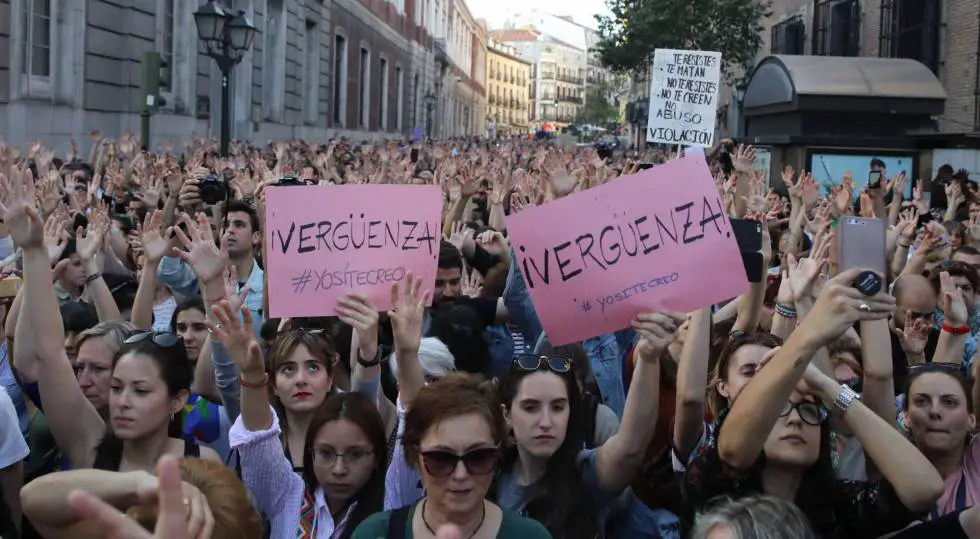In 2016, a group of five men gang-raped an 18-year-old woman inside of an empty building in Pamplona during the running of the bulls ceremony. Since this past June, they’ve been out on bail.
Early on July 7, 2016, a young woman called the Police of Pamplona to report a rape. She said that she was going to her car to sleep when a group of men accompanied her. They pushed her through a doorway and into an empty building where no one could witness. Three of the men committed the rape, while the other two recorded videos of the crime with their phones. They uploaded and sent the videos to each other through WhatsApp. Their group name, “la manada” (wolf pack), would become the name for the sexual abuse case that followed.
The “la manada” trial revolved around analyzing the videos that the group produced, the crucial evidence in the case. A team of magistrates, defense lawyers and private accusers meticulously reviewed, frame-by-frame, the 96 seconds of videos that the group of men recorded. The woman had obviously not given verbal consent, and had in fact remained silent and appeared passive throughout the assault. However, experts in non-verbal language concluded that she had somehow given consent through her body language.
As a result, on April 26, the Provincial Court of Navarre sentenced the “wolf pack” to nine years in prison for sexual abuse. However, the ruling is not considered final, and the five men are currently out of jail on a €6,000 bail.
The ruling sparked outrage throughout Spain and internationally, with demonstrators voicing their displeasure. The Spanish government has promptly echoed the voices of the people, and is considering a “Yes Means Yes” sexual consent law, which would state that consent is defined by the person verbally and explicitly agreeing to have sex. Essentially, if they say yes, it’s consent. Anything else, including silence, would not be considered consent.

This could be a huge step in Spain’s sexual consent law, and would put them on the same level as countries such as Germany, the UK and Sweden, which just instituted a similar law on July 1. The law would ensure that there is no doubt as to whether or not consent has been obtained — the way it should be.
As the “wolf pack” were tried under current Spanish law, the court could have either convicted them of sexual aggression or sexual abuse. Sexual aggression occurs when there is violence or intimidation involved, including the use of weapons or other dangerous means. A sexual aggression conviction can result in 12 – 15 years of prison time. However, because the court saw that there was no imminent threat to her life, and because they interpreted her silence and passiveness as some kind of ambiguous form of consent, they charged the offenders with continued sexual abuse, resulting in nine years of prison time.
The uncertainty involved in determining the so-called consent of the victim is the very reason why the Yes Means Yes law is being considered. Calven Calvo Poyato, Spain’s deputy prime minister and equality minister, announced the new law promptly after the outrage that resulted from the court’s ruling. “If a woman does not expressly say yes, then everything else is no,” she said.
The Yes Means Yes movement certainly is a step in the right direction in terms of considering the voice of the victim. The fact that Spain is moving toward an unambiguous definition of consent is nothing short of positive. There is a great chance that this law will help reduce non-consensual sexual crimes.
It is difficult to predict, however, how effective this will be in a court environment. In the “wolf pack” case, there was clear video evidence of the group assaulting the woman. Having that kind of evidence is rare, and the court still convicted the group of the lesser crime of sexual abuse.

Quite basically, sexual aggression is when there is violence or intimidation involved, whereas sexual abuse occurs without violence. But the interpretation of violence and non-violence can be rather vague. I, for one, would argue that being approached by five men and pushed into a building in order to have sex is rather intimidating, and intimidation would constitute sexual aggression.
It seems odd that this kind of crime would be broken up into two different categories when really, I think there should only be one overarching crime. There was a lot of speculation during the “wolf pack” case about the consent of the victim, but there was also speculation over whether the act was violent or not. If there is even a little ambiguity in the language of the law that results in poor rulings, then lawmakers should work to better define those laws.
Spain’s implementation of the Yes Means Yes law is a push toward the right direction, but I think that what defines sexual aggression should also be made even more clear in order to justly convict those who commit this kind of crime.
















